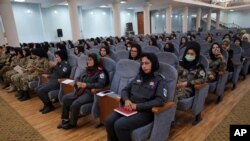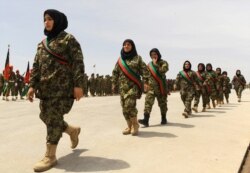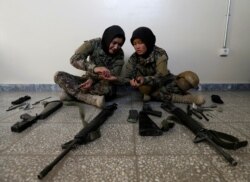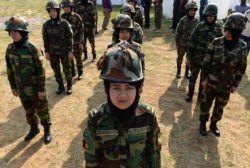As the Afghan government plans to more than double the number of women in its security forces by 2024, analysts say a wave of targeted killings could deter many from joining.
Last month, the Afghan Interior Ministry announced plans to increase the number of women in law enforcement from around 4,000 to 10,000 in the next three years.
The announcement came after a female police officer was killed on her way to work in Jalalabad, a city in eastern Nangarhar province. No group has claimed responsibility for the attack, but female police officers say they are worried.
“We are very concerned,” said Fatema, 42, a policewoman in Kabul who asked not to use her real name due to safety concerns. “Women are targeted every day. No one knows what is going to happen, and no one knows who the next target would be.”
The Afghan Independent Human Rights Commission (AIHRC) said last week that at least 14 women have been killed and 22 others wounded in the targeted killings since January.
Fatema, a mother of four, said her family was “very worried” about her, following the string of attacks against working women.
“If the targeted killings continue, I do not think families would allow their women to work outside home,” Fatema told VOA, adding that she wishes to continue in her profession despite the risk, “because I love my work, and I am happy serving my country.”
In a report released in January, the U.S. Special Inspector General for Afghanistan Reconstruction (SIGAR) said that as of 2020, 3.25% of uniformed Afghan police and less than 1% of the uniformed Afghan army were women.
Personal risk
In its report, SIGAR said that “despite enormous obstacles,” such as cultural barriers and illiteracy, Afghan women continued to join the Afghan National Defense and Security Forces (ANDSF), “often at a great personal risk.”
Among the seven Afghan women who were posthumously given the U.S. State Department’s 2021 International Women of Courage Award, three were working with Afghan security agencies.
The award recipients — General Shamila Frough, Fatima Rajabi, and Freshta — were targeted and killed in Kabul, Ghazni and Kandahar provinces in 2020.
Shinkai Karokhil, a member of the Wolesi Jirga, Afghanistan’s Parliament’s lower house, said the government must take extra measures to protect women who work with the security agencies.
“Those perpetrators should be arrested and brought to justice,” she said. “Not only the police but also physicians, journalists and civil society members are in danger.”
Human Rights Watch said last month that insurgent groups have increased their attacks on women and minorities in Afghanistan.
The United Nations Assistance Mission in Afghanistan (UNAMA) said in February that more than 3,000 civilians were killed, and 5,800 others injured in Afghanistan in 2020, despite the ongoing peace talks between the Afghan government and the Taliban militant group in Doha, Qatar.
Social challenges
Besides living with the threat of violence, Afghan women joining the security forces face other challenges, said Munira Yusufzada, deputy minister of national defense for education and personnel.
“My family and relatives did not want me to work with police,” she told VOA. “When I was appointed in the Defense Ministry, people harassed me on Facebook. They used offensive language. Even some officers (in) the military, those in remote areas, would tell me that ‘we do not accept a woman.’”
“But this is changing,” Yusufzada said. Having more women at the decision-making level in security agencies helps to overcome social stigmas associated with women working in the security sector, she said.
“We want to bring more women to the leadership and management to break the taboo,” she added.
Hosna Jalil, Afghanistan’s deputy minister for women affairs, said “reforms have been made to improve the recruitment process and work environment in the Ministry.”
“The process that used to be long and bureaucratic has been shortened, and new procedures are established not only to increase the number of women but also to improve the quality of the recruitment and their work environment,” said Jalil, who has also served as Afghanistan’s deputy interior of minister.
Recruiting women into security forces, particularly the police, is critical, Jalil said, adding that based on their calculations, at least 10,000 female police officers would be needed to deal with violence against women and child abuse.
“Women are more effective in tackling these issues,” she added.
Women concerned
Women’s rights activists in Afghanistan are worried over their future as the Afghan government and the Taliban continue negotiating a political settlement to end the country’s war.
Women fear that any power-sharing arrangement that brings the Taliban into the government would threaten their rights and freedoms they have achieved in the last 19 years.
For the Afghan government, Jalil said, preserving women’s rights gained in the last two decades is an essential part of its negotiations with the insurgent group.
According to the Afghan government, about 30% of civil servants and nearly 28% of Parliament members are women who were not allowed to work outside their homes during the Taliban’s rule.
Heather Barr, a senior researcher for women’s rights in Asia for Human Rights Watch, said the Taliban’s attitude toward women has not changed since the late 1990s, when they ruled in Afghanistan.
“The changes are small, and the Taliban are still fundamentally opposed to gender equality and to most women rights,” Barr told VOA.
Under the Taliban, women were denied rights to education and employment. The militant group also forced women to cover themselves from head to toe and prevented women from leaving their houses without a male companion.
Barr said the Taliban are gaining “more power” in the battlefield and negotiations table, and “it is not good news for women.”



